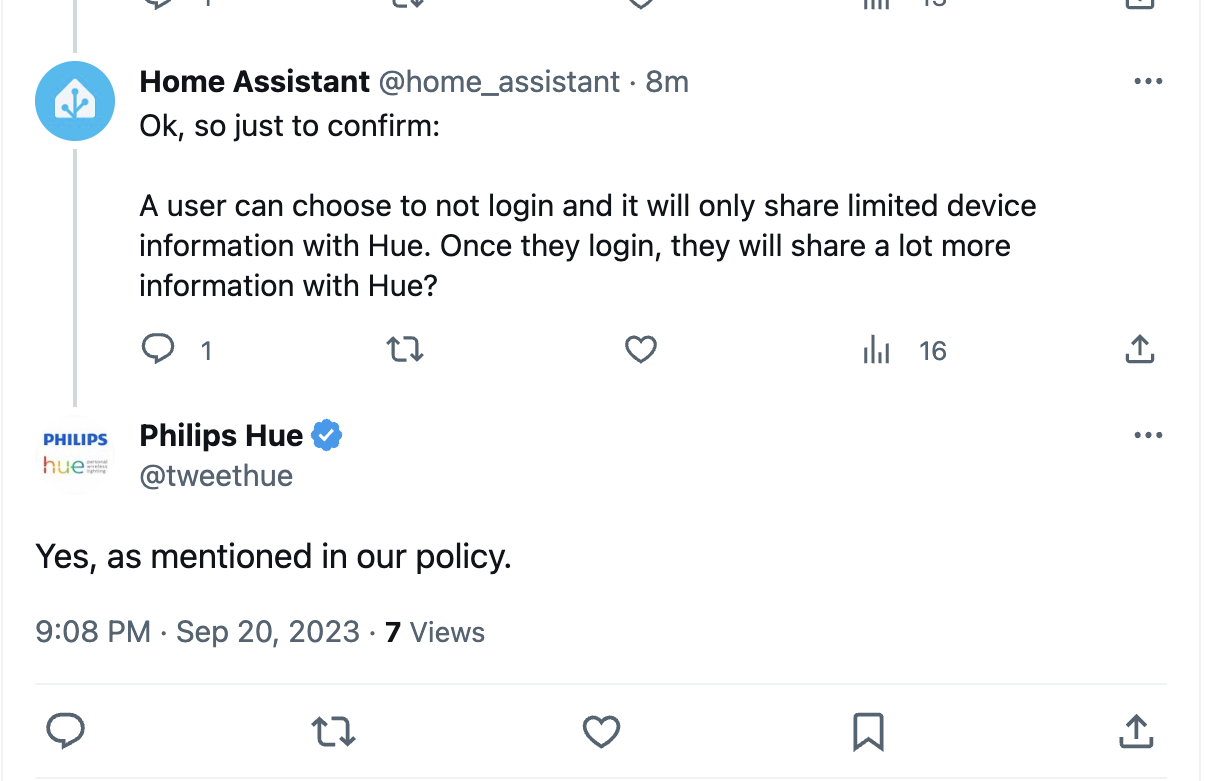- cross-posted to:
- [email protected]
- [email protected]
- cross-posted to:
- [email protected]
- [email protected]
cross-posted from: https://lemmy.world/post/5717757
Today’s story is about Philips Hue by Signify. They will soon start forcing accounts on all users and upload user data to their cloud. For now, Signify says you’ll still be able to control your Hue lights locally as you’re currently used to, but we don’t know if this may change in the future. The privacy policy allows them to store the data and share it with partners.



Location data, when you’re home/not home, which room you’re likely in/not in. Data that costs almost nothing to produce, but can be sold for millions.
Bulbs tell them when you’re in the kitchen, bathroom, bedroom, etc. Relatively easy to combine it with smart tv, smart watch, security cam, and app/phone data to identify you exactly.
Combine it all and it’s likely they’d be able to identify you exactly and identify what you’re doing with a high degree of certainty, then micro-target you with ads or propaganda.
Honestly, there comes a point where you’d have more privacy shoving a camera up your ass. Less privacy than the DDR.
A lot of people don’t seem to understand that each individual bit of data is often not valuable in itself, but it is as part of a whole.
Basically, everything there is to know about you is a jigsaw puzzle. Many companies out there want that finished image, so they pay a premium for each individual piece of the jigsaw, and the companies you give your data to everyday are selling those pieces.
This might be a stupid question, and I don’t know if anyone would even have the knowledge to answer… but is this data ever audited? Other than possible lawsuits, what prevents me from randomly generating data points for my customers and selling them to these companies? I assume they are cross referencing with other data sets and they could catch on quickly?
When you sell fraudulent data you get sued for fraud. You can sell low quality data if you advertise it as such.
If you create fraudulent data like adnausium you’ll likely just get banned from Google.
A lot of this data is given for free in exchange for analytics from FB or Google on ad conversion…
"Big dat"a has become a buzz word, but it’s a very real, potent and also frightening thing.
As an added bonus, anything with unnecessary wireless functionality can easily be hacked, controlled and monitored by anyone savvy enough
It would be hella cyberpunk for someone to hack lightbulbs, install IPFS on them, and set up free storage for everyone.
Somebody would fill it all with goatse bitmaps or random numbers or something, but for a fleeting moment the internet would be weird again.
And now you can do it with curl!
Intelligence / espionage agents will have a field day with this kind of info.
Likely they want detailed user data and what devices you use, and they want to cross reference that with geolocation so they can upsell you stuff.
I would say it’s likely they’ll start serving ads in the app and “recommending” you other services or things like a subscription. Any app that you have to look at will get ads these days, just look at Uber.
This is why I bought IKEA bulbs that are dumb. I avoid anything that uses an app, because it will update itself to make a new thing sell better.